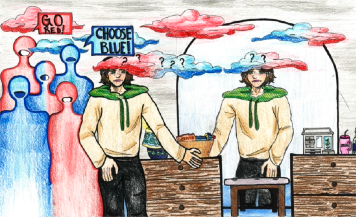Reform is essential to end homelessness
It is easy to see someone begging for money on the streets and look straight ahead, walking by without stopping. Erasing that image of poverty from your memory can seem easy enough compared to the discomfort of reflecting on the reality of homelessness. Many mainstream solutions toward homelessness reflect widespread discomfort, with many simply putting a Band-Aid on the complex issue rather than solving any problems.
It is easy for many to separate themselves from homelessness, as it seems like something that could never happen to them. But the fact is, unthinkable struggles are happening to hundreds of thousands of people from all backgrounds, and homelessness could happen to anyone. Homelessness is happening right now, and not enough is being done to prevent it.
Some might speculate that homeless people are not working hard enough for a job that would pull them out of their situation. A job can seem simple enough to earn for the financially privileged, but this is only sometimes true.
Lazarus House, a homeless shelter in St. Charles, assists those struggling in the Kane County community by offering resources like individualized case management, including support in finding jobs. Even as the staff promotes an end goal of independent living, Operations Manager Amy Dimiceli completely understands the struggle of finding a job while homeless.
“People say, ‘Just get a job’, but [if someone] is struggling with mental health, how are they supposed to get a job before they can get that in order?” Dimiceli said.
When someone becomes homeless, maintaining a previous job can be difficult due to the pressure of finding shelter. Even those who are employed while homeless may not be able to live without assistance. According to the Massachusetts Institute of Technology Living Wage Calculator for Kane County, the minimum wage for someone living comfortably as a single, childless person is $19.23 an hour. The current minimum wage of $13 an hour is not nearly enough for someone to live, especially if they are already dealing with homelessness.
Aside from unfair wages, many homeless people deal with other issues that keep them from working. Many problems that may have been unnoticed when they had money, like mental illness and addiction, can be brought to the forefront.
“The National Coalition for the Homeless has found that 38% of homeless people are alcohol dependent, and 26% are dependent on other harmful chemicals,” author Krystina Murray wrote in an article reviewed by an addiction specialist.
Homeless shelters work with those who struggle with addiction and mental illness daily. Still, emergency housing is not a replacement for rehabilitation centers or mental institutions. Many homeless people need additional recovery but are often financially unable due to a lack of government funding, leading many to live a lifetime in and out of homelessness.
Even with those in offices that fight to reduce homelessness, legislation is seldom passed, as homelessness has become a political topic rather than a human decency issue.
“Depending on who’s in office, we have something, and we don’t have something, we have something, and so on. Fixing all those in-betweens would help us give more resources to somebody,” Dimiceli said.
Although most politicians on both sides of the political spectrum are against homelessness, disagreements on how many resources the government should extend make shelters like Lazarus House have to adapt to new conditions constantly. Some politicians against implementing extensive resources are concerned about spending too much money, but regulating the top one percent’s wealth could eliminate this concern.
“During the COVID-19 pandemic, billionaires in the United States have become unfathomably richer to the tune of $637 billion total,” journalist Taylor Griggs wrote in an article about wealth inequality. “This is while tens of millions of Americans have lost their jobs.”
Even as the rest of the world suffered from the pandemic, billionaires’ wealth grew exponentially, leaving thousands homeless and jobless, with few attempts made by the government to regulate the distribution of wealth.
Some may attack the one percent for hoarding wealth, but a few individuals cannot change homelessness alone. Homelessness can only be solved by listening to the homeless community and creating comprehensive federal legislation to tackle every aspect of the topic.
“At Lazarus House, we are neighbors helping neighbors. I don’t think it is like what people outside of Lazarus House would perceive homelessness as,” Lazarus House Center for Transitional Living Case Manager Katie Collins said.
Homelessness affects many people’s neighbors, family and friends, yet it is treated as taboo. Homelessness is curable, but massive changes need to be made. It is of considerable importance to reform current solutions, with helping people at the center of the movement. Being uncomfortable when discussing homelessness is expected, but it is equally significant to push through and, in the words of Lazarus House Women’s Case Manager Monse Rivera, “Be open to those uncomfortable thoughts.”

Name: Lizzy Sidman
Position: Production and Ads & Business Executive
Graduation year: 2024
A few sentences about...








